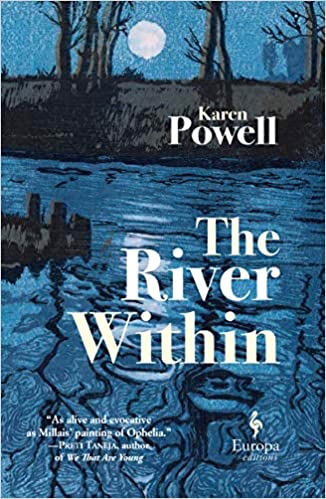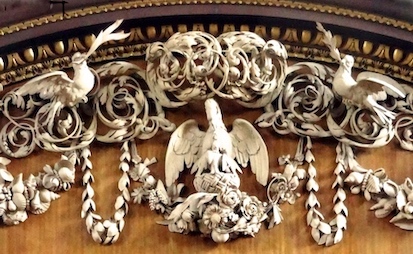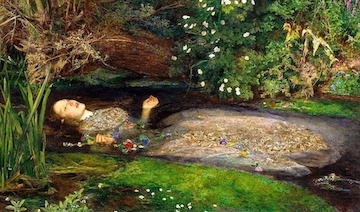“[Ultimately,] the river would flow on…long after the earth had closed in around the bones of the past, and the land would become what it always had been: a palimpsest, waiting for a new story to be told, which was always the old story, of love and loss and joy and grief.”
 Stories both new and old surround the often wild river which flows through North Yorkshire, exerting an almost incalculable force on the lives of the residents of the village of Starome. Good and evil, happiness and sadness, all begin and end with the unnamed river, which becomes almost a character in The River Within by Karen Power. In the novel’s own opening quotation, Danny Masters drifts in the water, undisturbed, “his feet nudging the river bank, his arms lifted above his head as though relishing the summer warmth after the silt and gloom of the bone-cold cavern where he’d been lodged these past days.” The reader quickly realizes, with horror, that Danny’s return home is both real and symbolic – he is physically back in the village where he grew up and worked, but he has left the earth, spiritually, forever. Three friends – Thomas Fairweather, his sister Lenny (Helena), and Alexander Richmond – walking along the river bank, discover Danny’s decaying body. All have known Danny well, their lives and activities overlapping since childhood.
Stories both new and old surround the often wild river which flows through North Yorkshire, exerting an almost incalculable force on the lives of the residents of the village of Starome. Good and evil, happiness and sadness, all begin and end with the unnamed river, which becomes almost a character in The River Within by Karen Power. In the novel’s own opening quotation, Danny Masters drifts in the water, undisturbed, “his feet nudging the river bank, his arms lifted above his head as though relishing the summer warmth after the silt and gloom of the bone-cold cavern where he’d been lodged these past days.” The reader quickly realizes, with horror, that Danny’s return home is both real and symbolic – he is physically back in the village where he grew up and worked, but he has left the earth, spiritually, forever. Three friends – Thomas Fairweather, his sister Lenny (Helena), and Alexander Richmond – walking along the river bank, discover Danny’s decaying body. All have known Danny well, their lives and activities overlapping since childhood.
Danny, who was not able to go to college, has recently returned home for a visit after undergoing training for the army, and he has spent some time with his vacationing friends after his return. All are stunned by the discovery of his body, as all have shared special, private relationships within the group and with Danny. A classic dark melodrama evolves, with intense, emotional scenes, as these late teens try to figure out who they are, what they believe, who and why they love, and how they deal with frustration. Both Danny and Alexander are or have been in love with sweet Lenny, who, at the time of the action, is hoping to marry Alexander. At the same time, life is changing for their parents, people like Venetia and her husband Angus, who have found that owning Richmond Hall, a large agricultural estate, does not provide enough income to keep the manor house updated. The trickle-down economic effect also makes its mark on Peter Fairweather, father of Lenny and Thomas, who manages the day-to-day finances of the estate.

In one room in Richmond Hall is a wood garland framing a panel with a “tangle of carved birds” by Grinling Gibbons
The stories of all these intersecting relationships evolve within short chapters told by Danny and Lenny, primarily in August, 1955, up until Danny’s death, with Lady Venetia Richmond, Alexander’s mother, also contributing stories throughout, providing background from the mid-1930s and through 1955. Alexander, as the son and heir of Richmond Hall, is a significant main character and drives much of the action, but he has no chapters in which he is the speaker. Instead, he is shown through the eyes of others, a complex character whose sometimes erratic behavior affects all of them, and whose own psychology is a constant mystery. Part of this is undoubtedly due to the fact that Lady Richmond, his mother, is a cold, undemonstrative woman whose relationship with Alexander, has always been more formal – even distant – than what he needs for understanding his world.
While all the characters are are trying to live and understand their lives, death plays a big role, from the death of Danny Masters at the beginning of the novel, to the deaths of several other characters in the course of the action – through illness, accident, possible murder, and suicide. At no point does author Karen Powell or any other character draw obvious parallels with the action in Shakespeare’s Hamlet, a comparison which appears in early reviews of this novel. The author herself does use a quotation from Hamlet, Act IV, as the single-sentence epigraph beginning the novel – “Too much of water hast thou, poor Ophelia” – referring to Ophelia’s drowning in the play – but she does not make any additional direct references to Shakespeare or Ophelia after that. Hamlet’s love story with Ophelia does find a few obvious parallels with that of Alexander and Lenny, but the novel is significantly different beyond that in terms of who dies, when, why, and even by whom. In addition, the scale of the deaths and what the reader/viewer learns from them are dissimilar. The novel is the world “writ small,” far from the more universal real world as Shakespeare portrays it, perhaps a deliberate irony. Two quotations featured on the back jacket of the book are what seem to confirm the author’s and/or publisher’s intent to draw parallels between this book and Hamlet, a comparison which draws the reader away from the author’s story and its implications, without adding depth or grandeur to it.
Those who love romances, dark melodrama, and/or psychological stories will enjoy reading this one, which celebrates the emotions, feelings, and self-focused behavior of many of its characters. Stories long buried in the past emerge near the end, involving the background and death of Lennie’s mother, and the imminent deaths of both fathers – Angus Richmond and Peter Fairweather – creating a scenario in which the focus is clearly on their children and their actions. The concluding paragraphs feel compressed and omit details related to the growth of some characters’ feelings and motivations, and it is the Epilogue in which Venetia leaves the manor house for a cottage on the property below hers which provides some of the resolutions readers will be looking for. “Was that all a family amounted to? [she wonders]. A jumble of furniture heaped up on the Great Lawn like abandoned props on a stage, the curtainless windows of her sitting room an empty backdrop? Soon developers would come to scrape the house from the landscape, making way for other lives. The river would flow on, though, long after the earth had closed in around the bones of the past, and the land would become what it always had been….the old story, of love and loss and joy and grief.”
Photos. The River at River Moors National Park in N. Yorkshire, where this novel takes place. https://www.dreamstime.com
In one room in Richmond Hall is a wood garland framing a panel with a “tangle of carved birds” by Grinling Gibbons. https://www.grinlinggibbonsphotos.com
Ophelia singing in the river, a painting by John Everett Millais, 1851-1852. https://www.etsy.com
The author photo appears on http://blakefriedmann.co.uk
At one point Danny finds Lennie picking black roses along the Stride. https://www.amazon.com




